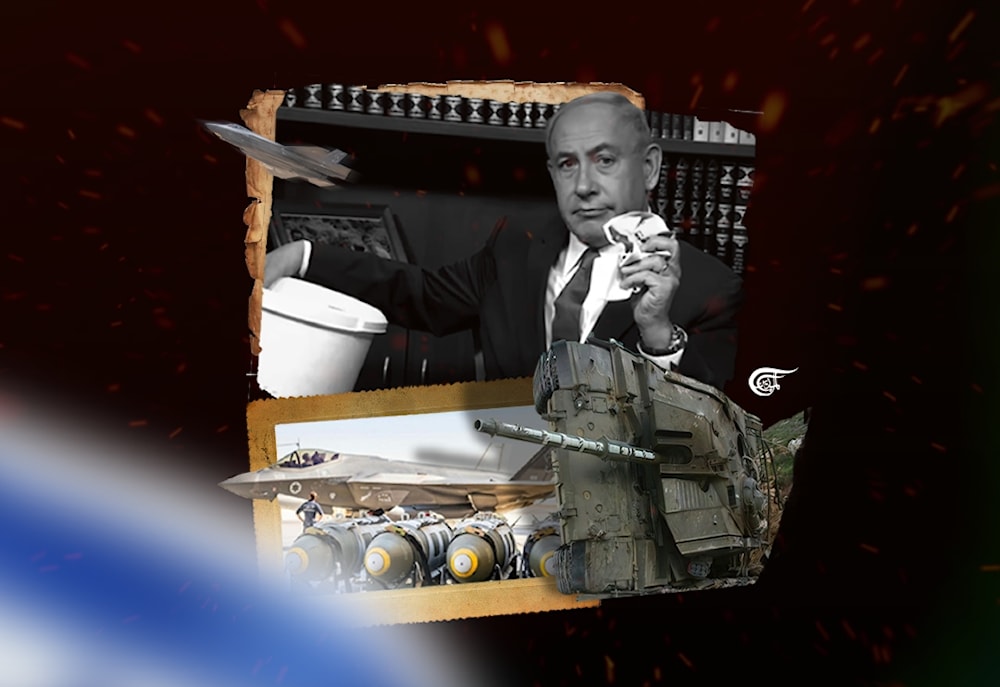Does 'Israel' want war?
A time of imponderables has arrived. War never proceeds according to plan.
-

Already, "Israel" has the White House committed to support an Israeli military operation against Hezbollah. (Al Mayadeen English; Illustrated by Zeinab El-Hajj)
"Israel" is deeply divided. That is not news. It is a commonplace, and more usually the question is phrased as ‘bifurcated – but along which axis’? Today the cleavage is between a tired, and increasingly pessimistic army versus a seemingly determined political leadership, which insists, ‘There is no choice but war -- if Israel is to survive.’
Popular support for now leans toward the latter – Netanyahu’s perspective.
Whilst Netanyahu has many harsh critics -- including within the White House -- the West generally ignores the reality that "Israel’s" desire for a military campaign in Lebanon extends beyond Netanyahu, to many others in Israeli politics. The choice is between: "War now; or War later" -- as is understood by many Israelis seeing the surrounding walls unerringly close-in upon "Israel".
It is all too easy in the West to repeat the narrative that Netanyahu is playing ‘fast and loose’ with "Israel’s" future; just to secure his own personal prospects. The reality is that both sides to this internal Israeli schism have their points: Those in the West may not agree with either view, preferring quiet and fearing for "Israel’s" future; but some climatic dénouement to the dynamics unleashed in 1948 is ultimately bound to unfold.
Israeli journalist Alon Ben David (a leading military affairs commentator with Channel 13) reports that the losses suffered by the Israeli army in Gaza have significantly diminished its capabilities to wage war on multiple fronts. He argues that Israeli forces are "not currently ready for a broad campaign in Lebanon."
"If a broad war with Hezbollah is imposed on us, the [Israeli army] will fight with what it has, and it will hurt the enemy … [but the army] is currently unable to bring about a significant achievement against Hezbollah and dramatically to change the reality in the north".
Ben David warns that the war in Lebanon
"will end in a bad settlement that will be achieved at a painful price … Never, throughout its 76 years, has the [army] been built for a nine-month war. Instead [it] was built as a shock army, which mobilizes the reserves at the moment of command; goes out decisively in a short time, and then returns to normal".
Ben David adds that a senior Air Force reserve officer has sent a letter to army authorities "imploring" them to "make it clear to the political echelon that the [army] is not prepared for a prolonged campaign in Lebanon."
The main -- and genuine -- problem the government faces is in regard to public expectations. The state evacuated some 80,000-100,000 residents from their homes on the border with Lebanon in the period after 8 October. Presently, there is no date for allowing them to return home. Popular anger is growing at this perceived strategic failure. Strong pressures are therefore being applied by the residents of the north, the media, and the opposition.
On the other side, senior IOF officials say they believe Hezbollah has lost the advantage of surprise - after much of "Israel’s" north has been evacuated. "Ultimately, we’ll have to return northern residents back home. If an agreement ensuring their safety won’t pass: we’ll have to take action." Another senior officer said any political agreement is meaningless without a ground operation along the border aimed at destroying Hezbollah’s entrenchment in the area. "Airstrikes won’t destroy the infrastructures", he stressed.
Benny Morris, a leading Israeli historian is even more adamant:
"To survive, Israel must strike Iran now. We [Israelis] have arrived at the moment of truth and a decision is necessary. The world should support such an operation. But even if it doesn't, surely the country's survival should be more important to its inhabitants than possible international condemnations and even sanctions if they are imposed (though I doubt that serious sanctions would be imposed).
"There's no better moment to deliver a strategic blow against Iran, given the current asymmetry in capabilities between the two countries … Israel has a dramatic advantage in aerial capabilities thanks to its advanced F-15 and F-35 stealth aircraft. But, above all, Israel has one singular advantage (according to foreign press reports): It possesses a nuclear arsenal, whereas Iran currently only aspires to achieve one".
And, if "Israel" should prove incapable of destroying the Iranian nuclear project using conventional weaponry, then it may not have any option but to resort to its nonconventional capabilities, writes Morris.
‘Behind the behind’ lies another dynamic: When Netanyahu, with full bravura, welcomes a seven-front war, the West presumes - at best – an utter recklessness on his part. Or madness. However, plans for a further, definitive al-Nakba, the displacement of the Palestinian and Arab populations from the "Land of Israel" have circulated for many years.
More probable than mere incautiousness, Netanyahu and his allies possibly espy an opportunity here (i.e. a malleable Biden) and a distracted Washington to inveigle the US to join with "Israel" in a wider war against Hezbollah -- and even Iran (though Washington will not want that).
Israelis have chutzpah, but they are not stupid. Slowly, slowly catchee monkey, as the saying goes. Already, "Israel" has the White House committed to support an Israeli military operation against Hezbollah.
Further assisting Netanyahu in this enterprise is that the West automatically presumes that the IOF underestimates Hezbollah’s military and missile capacities. As The Economist worries, "even if American destroyers offshore were to take out larger missiles, Israel’s defensive systems would be swamped in places, resulting in heavy casualties—some estimates suggest tens of thousands."
"If Israel cannot stop [Hezbollah’s] missiles before they launch, Israel’s aims, writes Yitzhak Gershon, who was deputy commander of Israel’s northern command in recent months, will be "to destroy the state of Lebanon to its foundations". Gaza would look like "paradise in comparison", he adds …".
Naturally, any such scenario as outlined above terrifies the West, who would feel bound to intervene -- if only to contain the Israeli war machine, plausibly to prevent the Middle East from being reduced to rubble. Netanyahu and others play on these fears. The more the US acts in lieu of their perceived risk of Israeli impulsivity, the more the US takes another step up the escalatory ladder’ -- as planned.
Will war happen? "Israel" is boxed in, with no solutions in sight. How long can a hiatus be sustained? Hamas is still standing strong, re-arming and recruiting; Hezbollah has humiliated the IOF in the north, the West Bank is smouldering -- and the next two months before autumn is the time when skies are clear and most suited to air operations.
A time of imponderables has arrived. War never proceeds according to plan.

 Alastair Crooke
Alastair Crooke
 5 Min Read
5 Min Read











